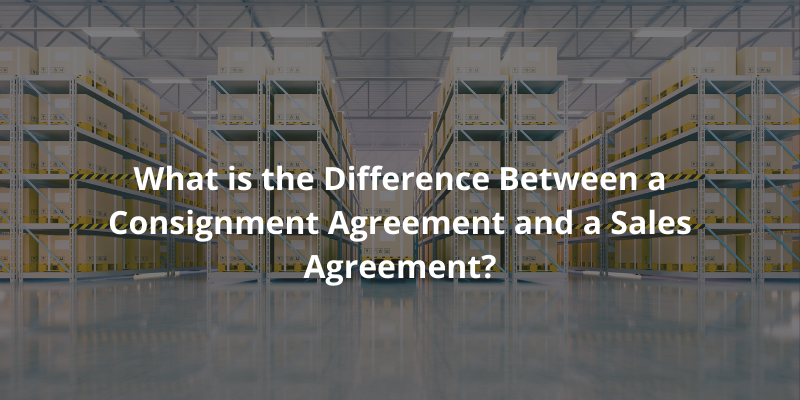Unlocking the Differences: Consignment vs Sales Agreement
7 Dec 2023
21 May 2021
min read

Do you have leftover stocks after a sale that you do not know what to do with? You might want to consider selling them under a consignment arrangement instead of throwing them out.
A consignment contract sets out the terms in which one party (the ‘consignor’) transfers goods to the other party (the ‘consignee’), granting them the legal right to sell on their behalf. The consignee acts as an agent in storing, selling, or transferring the good of the consignor’s goods and will be in possession of the goods rather than owning them. The consignee will receive a commission for goods that are sold. A free consignment agreement template can be found here.
Consignment agreements should be distinguished from sales agreements. In a sales agreement, the sale occurs between a buyer and a seller and is concluded once the goods are transferred to the buyer. The seller will then earn a profit.
.jpg)
Stakeholders in a consignment agreement
Consignor
The consignor is the owner of the goods. Ownership of the goods remains with the consignor during the consignment agreement.
Consignee
This is the person who will dispatch and arrange for a third party to purchase the consigned goods.
Purchaser
Purchasers can be consumers, another business, or a company that will purchase the goods.
What exactly is a Consignment Agreement? How is it different from a Sales Agreement?
A consignment agreement permits someone to sell goods on your behalf in exchange for a fixed fee or commission. This involves you (the consignor), transferring goods to the consignee, who will be your agent by selling the goods. While the consignee possesses your goods, you retain ownership until a third party purchases them. Usually, the consignee will store the goods in a warehouse until they are sold. When the goods are sold, the consignee will be paid a remuneration fee. If there are unsold goods, the consignee can return those goods to the consignor.
A sales agreement stipulates the terms of a transaction of goods for a price. The buyer will propose to buy goods for a monetary value. The seller will transfer both ownership and possession of the goods to the buyer. The contract will regulate the terms of payment and the description of goods. Additionally, instead of remuneration, the seller will profit from the sale.
What are the types of Consignment?
Outward Consignment
The consignee will send the goods to another place for sale. The consignor retains to be the owner of the property until they are sold.
Inward Consignment
Under the instructions of the consignor, the consignee will try to sell the goods.
What are the advantages of a consignment agreement?
Low Costs
Consignment enables businesses to operate more cost-effectively. With consignment, businesses can focus on product design and the manufacturing process instead of spending time and money on storing their goods in-store. This is especially the case as businesses are often unfamiliar with warehouse management. As such, hiring a consignee will help producers scale up their businesses and achieve economies of scale.
Geographical expansion
Some businesses may want to distribute their goods to other parts of the country but do not know how those markets operate. Recruiting local agents may help generate more sales as the agents better understand the local consumer base, such as their spending behaviour, demand, and pattern. They can adjust marketing strategies according to the local culture.
Better consumer-businesses relationships
Some agents already have established relationships with their customers. They understand what their customers want and have gained their trust, which will help drive up sales. Businesses that are just starting, on the contrary, may struggle to establish that initial trust. With a consignee on board, sales are likely to be higher.

What are the advantages of choosing to use a sales agreement instead?
Higher profit margins
With a sales agreement, the seller will receive a sum without having to worry about the inventory costs. On the contrary, with a consignment agreement, there is no guarantee that all the goods will be sold. The consignor might even have to pay for storage costs if the quantity of goods is very high. Moreover, they may not be able to negotiate prices with their customers as they are not directly in contact with them. Sales agreements therefore will result in greater higher profit margins.
A better understanding of the consumer base
By dealing with customers directly, the seller can better understand them. You may be missing out on key information about your customer if you are selling your products through an agent.
Better product design
Following the last point, if you are missing key information about your customer, it would be difficult to improve and design products, subsequently making it more difficult to retain your customer base.

What types of goods do people typically use consignment agreements for?
-
Potted plants
-
Cars
-
Clothing
-
Books
-
Magazines
-
Decorations
What do I have to look out for in a Consignment agreement?
Indemnification clause
An indemnification clause stipulates how risks are allocated in a contract. The principal feature of a consignment is that the consignor retains ownership of the goods until the goods are sold, while the consignee has physical possession of the goods. One might question: who bears the risk if the goods are destroyed in the warehouse?
The indemnification clause of a consignment agreement typically provides that the Consignee ‘shall indemnify the consignor against any loss, damage, liability, or claim caused by acts of the consignee that are not authorised by the agreement, or any willful or negligent acts of the consignee’. As such, if goods stored in the warehouse get destroyed by fire, attributed to the negligence actions of the consignee, the consignee will have to compensate the consignor in such circumstances. To avoid such liability, consignees usually insure the goods to ensure that the insurance company will pay for the compensation.
However, if the end-users have found that the goods sold are defective, the consignment will usually provide that the consignor will be responsible for any related claims.
Description of the goods
This clause will identify and describe the items that are up for sale.
Exclusive clause
An exclusive consignment agreement gives the consignee exclusive rights to sell the consignor's goods. Alternatively, a consignment agreement might also be non-exclusive. For example, if a person wants to sell a car, he or she can consign the car to two agents and inform them that the person who can sell it or her will get a 15% commission. Both consignees have the right to help the car owner to find a buyer.
Payment terms
This clause governs the cash flow of goods and the remuneration fee that the consignee will get for their services. This is an important aspect as cash flow within a transaction may limit what a business can do. This is particularly important for businesses that may be heavily dependent on one transaction to generate liquid cash.
Record-keeping
A record of sales and other expenses should be kept. The Consignee should also keep a record of the inventory for clear accountability. This is extremely important, especially when dealing with many goods.
Expenses
The consignment agreement should state what would be covered by the remuneration fee and what kind of expenses should be borne by the consignee.
Termination clause
Like all other contracts, a termination clause is extremely important as unforeseen circumstances can arise and transactions do not always go as planned. For a consignment agreement, the following are important considerations to consider when negotiating one:
-
The bankruptcy of the consignee
-
Goods are unsold by a certain date
-
Death of the consigner
-
Negligent acts of the consignee
What other documents do I need for a consignment agreement?
Proforma Invoice
A proforma invoice is a document used for international trade transactions.
The purpose of a proforma invoice is to inform the buyer of a precise payable for the goods being sold. This ensures the buyer is not met with surprise when they are informed of the final price payable when receiving a final commercial invoice from the seller.
It is important to note that the price stated in a proforma invoice is only a good faith estimate. The buyer will only be notified of the final, conclusive price when issued with a commercial invoice from the seller. Find a sample proforma invoice here.
For consignment, this will inform the consignee of the details of the goods that are about to be sold, such as the weight and quantity. This invoice will also indicate the minimum price of goods, which indicates to the consignee that they either must sell the goods either at this price or above it.
On the other hand, a sales invoice is a document that a seller will send to the buyer with the value charged for the goods and the description of the goods that are being purchased. Find a sample sales invoice here.
So, should I choose a sales agreement or a consignment agreement?
This depends on the capacity of your business and what you are looking for.
If you are looking to expand and get into large-scale production, a consignment may be more suitable for your purposes. Large-scale distribution requires extensive planning, and a consignor can reduce your workload tremendously.
If you are looking to maximize your profit margins, a sale may be more appropriate as you do not need to spend any money on paying remuneration fees to the consignee.
Keywords:

